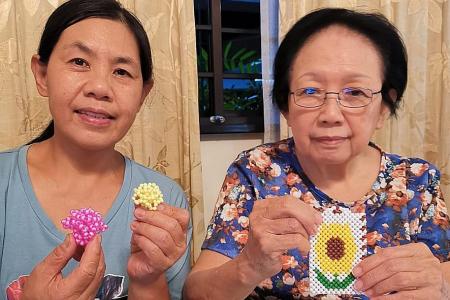Helper gets to run, cycle and swim during work hours
Helping domestic workers achieve work-life balance can create positive work environment for them: NGOs
She seldom exercised back home in the Philippines, but things have been very different after Ms Reusora Elsie Dechos started work in Singapore as a migrant domestic worker (MDW).
After six years, she has shed 12kg, going from 60kg to 48kg, and also achieved a work-life balance in her job that is the envy of many fellow MDWs.
"I am fortunate to have a flexible schedule where I can pursue my passions while working, and I am thankful that all three of my employers in Singapore have trusted me to manage my own time," Ms Reusora, 31, told The New Paper.
A typical day for her begins with walking the daughter of her current employers, a Canadian couple, to the girl's primary school at 8am.
Once done, Ms Reusora goes for a 5km run around the estate before returning home. Some mornings, she spends an hour cycling at the nearby park instead.
Once a week, she also swims at a nearby public swimming complex.
After her morning routine, Ms Reusora returns home to complete her household chores and prepare dinner.
Two years ago, she even joined a local dragon boat team despite not having any experience in the sport.
She goes for training once a week on her day off on Sundays when pandemic restrictions permit and hopes to take part in competitions soon.
Ms Reusora also signed up for the Decathlon Sports Fest 2021 6.5km walkathon, but her preparations were disrupted after she was served a quarantine order as she was a close contact of a Covid-19 case.
Undeterred, she brisk walked around her hotel room and eventually completed the walkathon in one hour and 20 minutes.
Apart from keeping up with her fitness regimen, Ms Reusora is pursuing a part-time advanced diploma in pastry and culinary design management, as she hopes to enter the food and beverage industry in the future. She attends weekly classes on Sundays and spends some of her weekday evenings preparing for them.
She said: "If employers give their domestic workers more work-life balance, it helps them to have a better relationship and it will create a positive work environment for the worker too."
A Humanitarian Organisation for Migration Economics (Home) spokesman encouraged employers to allow their MDWs to cultivate a work-life balance, adding: "MDWs live and work in their employers' house. Receiving breaks to pursue their own hobbies throughout the week will provide them a mental and physical respite from their work."
Filipino domestic worker Milagros Bangkiat, 58, spends an hour or more a day working on handicrafts - beading, crocheting and quilling - once the housework is done.
She told TNP: "It is a good way for me to relax. I also find joy when I look at my finished products."
She volunteers with the Centre for Domestic Employees (CDE) once every few weeks, imparting her skills to other MDWs.
Ms Bangkiat has been working in Singapore since 1985 for the same family.
HANDICRAFT
Her employer, Madam Yoo Leng Choo, even joins her in her handicraft hobby.
The 77-year-old retiree said: "I know having to work hard, far away from home is not easy. So I encourage Mila to spend time doing what she likes in her free time."
CDE executive director Lynn Koi said that to achieve work-life balance for MDWs, open communication with employers is key.
She added: "These MDWs usually enjoy a harmonious relationship with their employer, and appreciate their employers for giving them such flexibility and empowerment to pursue personal interests in their free time."
Mrs Cynthia Tay, 59, who has employed her current domestic worker for three years, agrees that work-life balance for MDWs is important, but believes it may be hard to achieve across all households in Singapore.
The business administrator, who has a good relationship with her MDW of three years, thinks that MDWs having work-life balance would require a change in mindset for some employers.
"Some employers can be quite controlling or hesitant in letting their helpers pursue their hobbies. So it may take a while for any change to happen," she said.
Recruitbee Employment director Stephenie Toh agreed.
"There are some employers who are willing to give their MDWs only two days off in a month. Even though these helpers are being compensated, it is not healthy in the long run as they need adequate rest," said Ms Toh.
She added that more employers need to be understanding of their MDWs, which includes being supportive of their interests and the courses they sign up for.
"There are some employers who are happy only when the courses their MDWs take are related to the work they do, such as cooking, baking or even language classes.
"But when their MDWs are interested in singing or dancing classes, they may not be too keen," said Ms Toh.
ADDITIONAL REPORTING: NADINE CHUA
Get The New Paper on your phone with the free TNP app. Download from the Apple App Store or Google Play Store now



